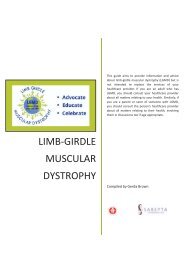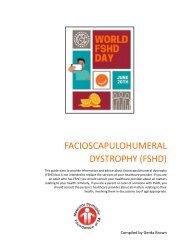MDF Magazine Issue 61 April 2020 (2)
You also want an ePaper? Increase the reach of your titles
YUMPU automatically turns print PDFs into web optimized ePapers that Google loves.
SHEDDING A LOAD
By Hilton Purvis
As Eskom load sheds us once again the neighbourhood
descends into darkness.
Everything goes very quiet as all household appliances
cease to function. There is an eerie silence, but if you listen
carefully you can hear a slight gurgling sound. This is the
sound of a little more of our country going down the drain
each time Eskom cuts the power.
Load shedding affects young and old, men and women,
but impacts on disabled people in some rather unique
ways, making our lives a little more precarious than they
already are. The first effect it had on me was to force me to
change the way I re-charge the batteries on my motorised
wheelchair. Before load shedding I would use the
wheelchair during the day and then set it up to charge during
the night, and have a fully charged wheelchair waiting for
me each morning. The problem now is that if we are load
shedding during the night the resultant surges in power
destroy the charging unit and degrade the wheelchairs
batteries. One might get away with a couple of power
outages without any damage, but sure enough it will catch
you one day. Electrical charging equipment and batteries are
just not made to be switched on and off suddenly during the
charging process, and certainly not multiple times each day.
The second area which impacted me immediately was my
computer. In my case, and I'm sure this applies to many other
readers, it is more than just a link to the outside world. It is
what I use to earn a living, and if we do not have power then
I am not able to work. In some businesses people are able
to get by doing things manually when the lights go out, but
this is not so for those of us using computers. We can buy
an uninterrupted power supply (UPS) but any unit powerful
enough to run a computer for more than three hours (load
shedding lasts for at least 2.5 hours) and be able to stand up
to at least two or three load shedding periods during a single
day will cost a fortune. Our government ministers might have
taxpayers funding their continuous power supplies, but sadly
I cannot claim the same luxury.
The third area in which load shedding immediately impacts
me is the ability to reach and communicate with people via
telephone or even mobile phone. In their eternal wisdom
Telkom is phasing out land lines. I realise that this is old
technology, and some citizens like to steal the lines, but at
least they used to provide a method of communication even
when there was no electrical power. The new wireless phones
require power to work. No power, no phone. If one uses a
cordless phone or a speaker phone, as many of us are forced
to do, they also do not work without power.
I used to think that my mobile phone gave me a safety net
with regard to communication, but most recently I have
discovered that load shedding impacts the mobile network
relay stations, and just yesterday when I tried to call a friend
during load shedding neither party could hear more than a
garbled noise over the line. Load shedding is knocking out
the battery backups of the mobile relay stations, rendering
many of them inoperable and reducing the quality of the
call signal. Generally the mobile phone will still work, but
sometimes it might not, and we have no control over when
that sometime may be and whether it is an emergency or not.
The bottom line is that if you are in trouble and there is no
power, you are in trouble!
There is a host of other noticeable impacts on our lives as
disabled individuals. such as the closure of shopping malls
during load shedding, often the only available source of
accessible food retailers; elevators no longer working
in buildings, which renders your source of employment
inaccessible; electrical access doors no longer functioning.
The list goes on. During the recent SONA speech our
president made vague reference to assisting the disabled
within our communities. It would have been far more
beneficial if he had announced an incentive scheme to
provide disabled citizens with uninterrupted power supplies,
or electrical inverters, or solar panel systems in order to
allow them to conduct a productive life. That would
have been a proactive and positive step for those most
vulnerable to load shedding. Unfortunately I don't see
anything forthcoming on that front in the near future.
Some may brush off these concerns, dismissing them as First
World problems. This would be a mistake. We live in an
integrated economy within an integrated world where the
ability to connect with one another easily and regularly
forms the basis of how we live and work. The destruction of
infrastructure being undertaken at present is resulting in
disabled people becoming more marginalised by the day.
Electrical power is the enabler in our lives; we do not have a
manual option.
30


















